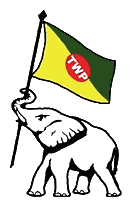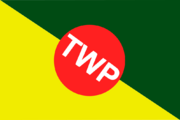True Whig Party facts for kids
The True Whig Party (TWP), also known as the Liberian Whig Party (LWP), is the oldest political party in Liberia and in all of Africa. It was started in 1869 by people called Americo-Liberians, who were mainly darker-skinned and lived in the countryside. Their main rival was the Republican Party.
After the Republican Party became less powerful, the True Whig Party took control of Liberian politics from 1878 until 1980. Liberia was mostly run as a one-party state by the TWP, meaning they were almost always in charge, even though other parties were allowed.
The TWP's ideas were first inspired by the United States Whig Party, which is where they got their name. They even used the elephant as their symbol, like the American Republican Party. Most of the TWP's support came from the Americo-Liberian community, who had a lot of power in Liberia. William Tubman, a long-time leader and President of the TWP, is often called the father of modern Liberia.
The TWP lost its power after a 1980 Liberian coup d'état (a sudden takeover by the military). Many of its leaders were killed or had to leave the country. This ended the party's strong position. The TWP was no longer officially recognized after the takeover, but it was never completely shut down. It continued as a smaller group.
The party later joined a group called the Coalition for the Transformation of Liberia (COTOL) for the 2005 election, but they didn't win many votes. After that, they left the coalition. In 2017, they won even fewer votes. By 2020, the TWP became part of the Rainbow Alliance (RA).
Quick facts for kids
True Whig Party
Liberian Whig Party |
|
|---|---|
 |
|
| Abbreviation | TWP |
| Leader | Reginald Goodridge |
| Historic leaders | Edward James Roye Anthony W. Gardiner William Tubman William Tolbert Clarence Lorenzo Simpson |
| Founded | 1869 (first incarnation) |
| Dissolved | April 1980 (first incarnation) |
| Preceded by | Opposition Party |
| Merged into | Coalition for the Transformation of Liberia |
| Headquarters | Monrovia, Montserrado County, Liberia |
| Ideology | Black conservatism Centralization Protectionism (until 1940s) Whiggism (until 1940s) Economic liberalism (after 1940s) Anti-communism (under Tubman) |
| Political position | Right-wing |
| Colors | Green Yellow |
| Historical ethnic affiliation | Americo-Liberians |
| Seats in the Senate |
0 / 30
|
| Seats in the House |
0 / 73
|
| Party flag | |
 |
|
Contents
History of the True Whig Party
The True Whig Party was started in 1869 in a town called Clay-Ashland. It was a new version of an older group called the Opposition Party. The TWP was in charge of a society where black American settlers and their families, known as Americo-Liberians, were a small part of the population. However, they were almost 100% of the people who could vote. The party mainly represented them and often worked with the Masonic Order of Liberia.
Early Years and Power
The True Whig Party first formed as a group of "dark-skinned farmers and merchants" who were against the lighter-skinned elite represented by the Republican Party. The TWP first gained power when Edward James Roye won the 1869 Liberian general election and became president the next year.
The Republican Party was usually supported by Americo-Liberians who had both African and European family backgrounds. Darker-skinned Americo-Liberians first supported the TWP. But as the Republican Party lost its power, most Americo-Liberians started to support the TWP instead.
After Anthony W. Gardiner was elected president in 1878, the TWP ruled Liberia for more than 100 years. Even though other parties were allowed and Liberia was not officially a dictatorship, the TWP mostly ran the country as a one party state. They had almost complete control over Liberian politics.
Challenges and Changes
In 1930, the party faced accusations of supporting systems where people were forced to work. They sent "contract migrant laborers" to Spanish colonists in Fernando Pó (now Bioko in Equatorial Guinea). These conditions were very similar to slavery. This led to an investigation by the League of Nations. The United States and Britain then stopped trading with Liberia for five years, and President Charles D. B. King had to resign.
Despite this problem, countries in the West generally saw the True Whig Party as a stable and safe force. The US and Britain later invested a lot of money in Liberia when William Tubman was president for a long time (1944–1971).
Tubman's Era: Growth and Stability
Under President William Tubman, the TWP supported the United States in international matters. They encouraged foreign businesses to invest in Liberia, promoted new industries, and started a big project to improve Liberia's roads and buildings. This led to a time of economic success in the 1960s. Tubman was praised for making Liberia well-known and a modern country in Africa.
Even though some people said Tubman's government was too strict, Liberia was seen by other countries as a stable and successful nation in its region. This was at a time when other African countries were having civil wars and political problems.
Tolbert's Leadership and Decline
After Tubman died in 1971, William Tolbert became the leader and President of the TWP. Tolbert changed some of the TWP's old policies. He wanted Liberia to be more independent and not rely so much on international businesses and governments. He started some more open-minded reforms, promised to control foreign businesses more strictly, officially recognized other political parties, and tried to make economic opportunities more equal between Americo-Liberians and native Liberian tribes.
He also started friendly relationships with the Soviet Union and shifted Liberia's focus more towards other African nations instead of just the West. However, some of these changes were reversed after the Rice Riots, where Tolbert ordered the arrest of opposition leaders. Other parties also accused Tolbert of using corruption and nepotism (giving jobs to family members) to stay in power. Some older members of the TWP and Tolbert's own cabinet were upset because he started appointing native Liberians to government jobs, which they saw as taking away their power.
The 1980 Coup and Aftermath
The party lost power after Tolbert was killed in a military takeover on April 12, 1980. This was done by soldiers from the AFL led by Samuel Doe. They were against Tolbert's crackdown on political opponents and what they saw as his acceptance of corruption.
Many important TWP officials were killed, and others fled the country. The new government then limited the TWP's activities, and it lost its official status. Most of its members left, but some vowed to continue, and it struggled on as a small group without official recognition. After the coup, people from native Liberian groups started to have more political power, which matched their larger numbers in the country. This further reduced the TWP's support, which had mainly come from the smaller Americo-Liberian population.
Doe's government also changed Liberia's foreign policy back to being pro-US. This made it harder for the TWP to gain international support as an opposition group, especially with fears about the spread of communism during the Cold War. In 1985, all political opposition, including the TWP, was banned after an attempt to overthrow Doe.
The True Whig Party Today
In 1991, a new group called itself the "National True Whig Party of Liberia." The TWP chairman, Momo Fahnbulleh Jones, threatened to take legal action to make the new party change its name.
The TWP was officially restarted in 2005 under the leadership of Peter Vuku.
The TWP took part in the 2005 election as part of the Coalition for the Transformation of Liberia (COTOL). This group won eight seats, but it broke apart the next year when some members joined the ruling Unity Party. The TWP planned to run as its own party for the House of Representatives in the 2011 election. They also supported President Ellen Johnson Sirleaf for a second term. However, the party had problems with its leadership before the election and didn't end up running any candidates.
In 2013, TWP members had a disagreement over the Edward J. Roye Building in Monrovia, which was built as the party's headquarters. The Liberian government agency had taken over the building. This made TWP members angry, as they said they were still the rightful owners.
In 2015, the TWP chose Reginald Goodridge, a former government minister, as its new chairman. The party was successfully registered to run as an individual party for the 2017 election, but they only received a small percentage of the votes (0.96%).
On August 31, 2020, a political group made up of seven parties, including the TWP, called the Rainbow Alliance (RA) was officially recognized. Reginald Goodridge was the temporary chairman of this alliance. The RA ran 10 candidates in the 2020 Senate elections but did not win. The RA held its first big meeting on October 29, 2022, in Paynesville. Goodridge was chosen as their main leader. The RA did not have a candidate in the 2023 presidential election. They also ran candidates in various legislative elections in 2023 but were not successful.
What the True Whig Party Believed In
The True Whig Party first tried to copy the ideas of the American Whig Party, which is where it got its name. The TWP was also described as promoting conservative ideas and black conservatism during Tubman's time as president.
In its early years, the party preferred to protect local businesses (called protectionism). But later, under Tubman, it started to support policies that allowed more freedom for businesses and trade (called economic liberalism or the "porte ouverte" which means "open door"). This was done to attract money and help the economy grow.
In terms of how it dealt with other countries, the TWP was generally pro-Western and especially pro-American. This was because most of its supporters were Americo-Liberians. Even though Liberia didn't declare war on Germany and Japan until 1944, the party supported the Allies against the Axis powers during World War II.
Under Tubman, the party was also against communism during the Cold War. It later supported America's foreign policy during the Vietnam War and stayed friendly with Israel. In November 1947, Liberia was one of the African governments that voted "Yes" for the United Nations Partition Plan for Palestine. This vote meant they accepted the idea of creating an independent country for Jewish people (the State of Israel).
Under William Tolbert's leadership, the TWP changed its ideas. Tolbert wanted to show Liberia's political independence. He moved away from being completely pro-Western and started building partnerships with other African countries. He also opened relationships with the Soviet Union, China, and countries in Eastern Europe. He tried to bring more native Liberians into government. These changes in ideas caused concern among both TWP supporters and politicians in Tolbert's government.
Images for kids
 | Valerie Thomas |
 | Frederick McKinley Jones |
 | George Edward Alcorn Jr. |
 | Thomas Mensah |



